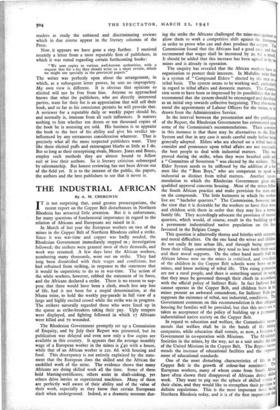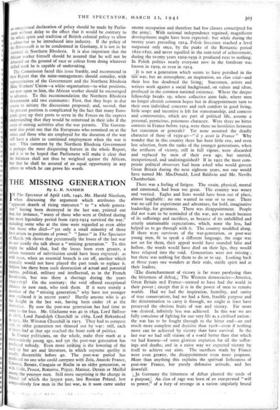THE INDUSTRIAL AFRICAN
By A. M. CHIRGWIN
IT is not surprising that, amid greater preoccupations, the recent report on the Copper Belt disturbances in Northern Rhodesia has attracted little attention. But it is unfortunate, for many questions of fundamental importance in regard to the relation of Africans and Europeans are raised in it.
In March of last year the European workers on two of the mines in the Copper Belt of Northern Rhodesia called a strike. Since it was war-time and copper was badly needed, the Rhodesian Government immediately stepped in ; investigation followed; the strikers were granted most of their demands, and work was resumed. A few days later the African workers, numbering many thousands, went out on strike. They had long been dissatisfied with their wages and conditions, but had refrained from striking, in response to the statement that it would be unpatriotic to do so in war-time. The action of the white workers, however, robbed the statement of its force, and the Africans declared a strike. There is no reason to sup- pose that there would have been a clash, much less any loss of life, had it not been for a stupid determination, at the Nkana mine, to hold the weekly pay-parade in full view of a large and highly excited crowd while the strike was in progress. The strikers naturally regarded those who were lined up in the queue as strike-breakers taking their pay. Ugly tempers were displayed, and fighting followed in which 17 Africans were killed and 70 wounded.
The Rhodesian Government promptly set up a Commission of Enquiry, and by July their Report was presented, but its publication was delayed and even now only a few copies are available in this country. It appears that the average monthly wage of a European worker in the mines is L.40 with a house, while that of an African worker is 22S. 6d. with housing and food. This discrepancy is not entirely explained by the state- ment that the European does the skilled and the African the unskilled work of the mine. The evidence shows that many Africans are doing skilled work all the time. Some of them hold blasting-certificates, others assist in shaft-sinking, yet others drive lorries or superintend machines. Many of them are perfectly well aware of their ability and of the value of their work, especially as they know that certain Europeans slack when underground. Indeed, at a dramatic moment dur- ing the strike the Africans challenged the mine-management to allow them to work a competitive shift against the Europeans in order to prove who can and does produce the copper. The Commission found that the Africans had a good case. and they recommend that wages shall be increased by 2s. 6d. a mood, It should be added that this increase has been agreed to by the mines and is already in operation.
The enquiry has revealed that the African workers have no organisation to protect their interests. In Mufulira mine there is a system of " Compound Elders " elected by the men on a tribal basis. The system seems to be working well, particularly in regard to tribal affairs and domestic matters. The Commis. sion seem to have been so impressed by its possibilities that they recommend that the system should be encouraged and developed as an initial step towards collective bargaining. They also recom- mend the appointment of Labour Officers for the mines, to he drawn from the Administrative Service.
In the interval between the presentation and the publication of the Report, the Rhodesian Government has commented upon some of the Commission's recommendations. Their comment in this instance is that there may be alternatives to the Elder System and that in any case it needs careful study before being generally adopted. Elders who are elected on a tribal basis to consider and pronounce upon tribal affairs are not necessarily the best people to deal with industrial matters. This was proved during the strike, when they were brushed aside and a " Committee of Seventeen " was elected by the strikers. The Elder System needs to be stiffened by the addition of a few men like the " Boss Boys," who are competent to speak on industrial as distinct from tribal matters. Another recom- mendation to which the Rhodesian Government gives only qualified approval concerns housing. Most of the mines follow the South African practice and make provision for men only on the compounds. The little hutments in which the workers live are " bachelor quarters." The Commission, however, take the view that it is desirable for the workers to have their wires and children with them in order that they may live a normal family life. They accordingly advocate the provision of married quarters, which would, of course, result in the building up of a permanent industrialised native population on the lines favoured in the Belgian Congo.
This question is admittedly thorny and bristles with economic and moral difficulties. On the one hand the wives and children do not easily fit into urban life, and through being uprooted from their village community they tend to lose both their social and their moral supports. On the other hand nearly half the African labour now on the mines is stabilised, and two-thirds of the children in the Copper Belt schools were born on the mines, and know nothing of tribal life. This rising generation are not a rural people, and there is something unreal in saying that they must be governed through their chiefs in accordance with the official policy of Indirect Rule. In fact Indirect Role cannot operate in the Copper Belt, and children born in the mines present an awkward conundrum, for Indirect Rule pre- supposes the existence of tribal, not industrial, conditions. The Government comment on this recommendation is that adequate housing for families will be provided, but that this must not tt taken as acceptance of the policy of building up a permanent industrialised native society on the Copper Belt.
In regard to education and welfare, the Commission real- mends that welfare shall be in the hands of the mining companies, while education shall remain, as now, a function Government in co-operation with Missions. The Mssionary , Societies in the mines, by the way, act as a unit under the tale of the United Missions in the Copper Belt. The Repo: recom- mends the increase of educational facilities and the :rnprost ment of educational standards.
One of the most disturbing characteristics of life in .Lbe Copper Belt is the growth of colour-bar sentimen% European workers, many of whom come from South Nfil. have often shown their disapproval of Africans doing skill' work. They want to peg out the sphere of skilled‘,!rvieett their claim, and they would like to strengthen their po-itol.'/ definite regulations. This is the most important issue bag Northern Rhodesia today, and it is of the first impormice an unequivocal declaration of policy should be made by Parlia- ment without delay to the effect that it would be contrary to the whole spirit and tradition of British colonial policy to allow a colour-bar to be introduced into industry. If the policy of the Iferrenvo/k is to be condemned in Germany, it is not to be tolerated in Northern Rhodesia. It is also important that the African worker himself should be assured that he will not be debarred on the ground of race or colour from doing whatever skilled work he is capable of undertaking.
The Commission faced this issue frankly, and recommend in their Report that the mine-managements should consider, with representatives of the Government and the Northern Rhodesia Mine Workers' Union—a white organisation—to what positions, not now open to him, the African worker should be encouraged to advance. To this recommendation the Northern Rhodesia Government add two comments: First, that they hope in due course to initiate the discussions proposed; and, second, that the present position is complicated by the fact that many Euro- peans gave up their posts to serve in the Forces on the express understanding that they would be reinstated in their jobs if the scope of mining activities after the war permits. The Govern- ment also point out that the Europeans who remained on at the mines and those who are employed for the duration of the war will have a claim to continued employment when the war is over. This comment by the Northern Rhodesia Government is perhaps the most disquieting feature in the whole Report, and it is to be hoped that Parliament will make it clear that the balances shall not thus be weighted against the African, but that he shall be assured of an equal opportunity in any sphere in which he can prove his worth.







































 Previous page
Previous page